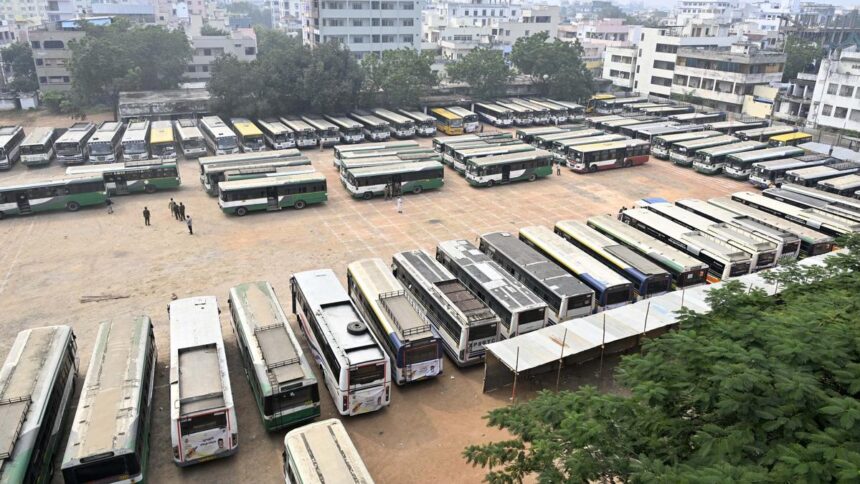[ad_1]

APSRTC will have to increase its manpower and deploy additional buses to meet the increase in demand for its services.
| Photo Credit: G. N. RAO
VIJAYAWADA
The TDP-led coalition government’s plan to implement free bus travel for women in Andhra Pradesh State Road Transport Corporation (APSRTC) buses is a commendable initiative, as it aims to improve women’s accessibility and mobility. However, it comes with substantial financial implications for the State government.
The government will need to compensate the APSRTC for the lost revenue due to free travel for women. The Corporation’s operational costs include fuel, maintenance, salaries for the staff and other overheads and these must be covered even if passengers don’t pay the bus fares. It is important to note that the State RTC already has accumulated revenue losses and additional subsidies from the government will put further pressure on its budget.
When the free travel becomes a reality, it will encourage more women to use APSRTC buses, necessitating an increase in operational demands and deployment of additional buses and manpower to operate the vehicles.
A delegation from Andhra Pradesh, led by Transport Minister M. Ramprasad Reddy, and comprising of ministers V. Anitha and G. Sandhya, Finance Secretary Ronald Ross, Principal Secretary, Transport and Roads and Buildings Kantilal Dande and executive directors and senior officials of the APSRTC, has just returned from Karnataka after studying the Congress government’s ‘Shakti’ scheme under which women there are allowed free travel in the KSRTC buses.
The KSRTC officials explained to the AP team that they inducted 2,000 additional buses, hired 9,000 staff and refurbished the existing buses in their fleet before implementing ‘Shakti’ scheme. They said after initial hiccups, they were able to regulate the bus operations effectively.
The TDP government intends to provide women of Andhra Pradesh domicile the facility to travel for free within the State on all non-premium buses operated by the APSRTC. The Corporation has around 11,200 buses and 73 % of them are non-premium.
The AP officials estimate that around 25 lakh women will benefit daily from the new scheme, which is expected to impose an additional monthly expenditure of ₹277 crore on the government. They said the feedback they received from the beneficiaries of ‘Shakti’ scheme in Karnataka was very positive.
It may be noted here that the Karnataka government has announced a 15 % hike in bus fares to offset the revenue losses incurred by the KSRTC on account of the ‘Shakti’ scheme. When asked if a similar fare hike is in the offing in Andhra Pradesh also where the government is gearing up to implement the free bus travel programme, an official source said it was unlikely “as our bus fares are slightly on the higher side compared to Karnataka”.
The free bus travel scheme for women presents a double-edged challenge for the government in the State. On the one hand, it aligns with the government’s social welfare goals of empowering women and enhancing their mobility, thus facilitating their participation in economic and social activities, on the other, it brings a fiscal and operational challenge. It is indeed a tightrope walk for the government tasked with balancing the priorities effectively.
Published – January 05, 2025 05:03 pm IST
[ad_2]
Source link







